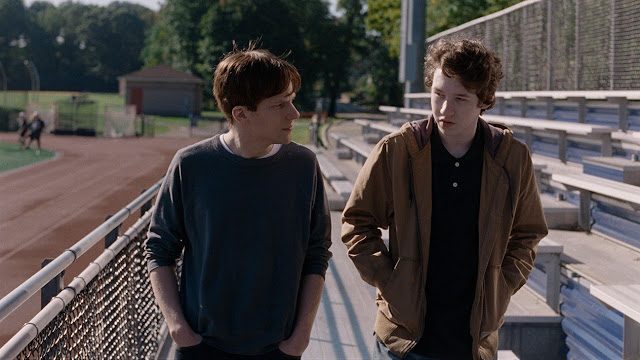Despite
being set up in the opening scene as the main character, Jesse Eisenberg takes
a back seat, allowing relatively unknown talent Devin Druid to shine in Joachim
Trier's bittersweet drama Louder Than Bombs. Eisenberg is on solid, if not
exceptional form as a son who returns to the family home to find his father and
younger brother still in a complete mess after the death of his mother. He
injects moments of welcome humour into what could have been a stifling
exploration of grief in the modern world.
College
lecturer Jonah (Eisenberg) has recently become a father himself and is feeling
the weight of responsibility when he is called home to sort through some of his
mother's belongings. His father Gene (Gabriel Byrne) hasn't managed to sort
through the undeveloped photos that his late conflict photographer wife took
before she passed, and now a gallery is hoping to put together an exhibition of
her final work. Jonah's younger brother Conrad is unaware of the exact
circumstances surrounding his mother's untimely death in a car crash. With a
revealing article about to expose the truth about her 'accident', Jonah and
Gene must decide whether they should tell the disturbed boy about his mother’s
depression before it becomes public knowledge.
Dealing
with grief and the fallout from a death in the family runs the risk of piling
on clichés and treading ground that has already been amply trodden on by many
filmmakers in the past. Even with its familiar troubled teen at the centre of
the story, Louder Than Bombs manages to be heard above the clamour of similarly
themed stories. This is largely due to terrific performances from its trio of
male leads and some perceptive exploration of what it means to live in a time
where everything is mediated, and it is increasingly difficult to find meaning
in life.
Conrad sits
in his darkened room, immersed in violent and fantastical videogames where he
can become any character he likes, or kill people at will. He is withdrawn and
surly, and his father has no idea how to communicate with him. The sadness of
this relationship and the catastrophic ways that Gene tries to learn more about
his son are tempered by some extremely comical moments. With Jonah helping him
to come out of his shell, Conrad blossoms into the film’s raw exposed heart.
Despite
bursts of voiceover from a number of different characters, as well as a complex
chronology that contains flashbacks within flashbacks, it is really Conrad’s
point of view in which we see the world through. His heart on sleeve writings
and curious dancing behind not-so-closed doors make him utterly endearing, even
if he does spit in a teacher’s face in one scene. Memories and dreams of his
mother have a powerful hold on his mind, but it is his fragmented view of the
world that resonates most. Like the flashes of his mother’s photos that we
occasionally see on screen, or the YouTube videos he consumes daily, Conrad is
lost in a disjointed reality, a reality reflected in the inventive structure of
the film.
Getting
under the skin of a few of its characters is daring, but could easily be
accused of a lack of focus. However, Louder Than Bombs has a decent stab at
examining not only three generations of men, but also the woman who affected
their lives in profound ways. All of the film’s flawed characters deliver
moments of heart and humour, but as distressed teen Conrad, it is Devin Druid
who deserves the most praise for his exceptional performance.
Watch the trailer:


No comments:
Post a Comment
Join me in conversation! Please leave a comment on your own pondering.